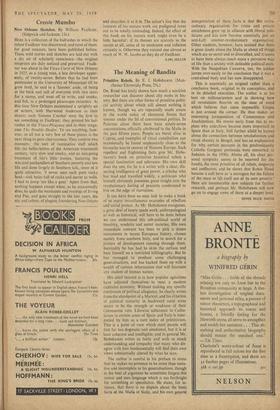The Meaning of Bandits
DR. RUDE' has lately shown how much a sensitive researcher can discover about city mobs in his- tory. But there are other forms of primitive politi- cal activity about which still almost nothing is known, though we are repeatedly made aware in the world today of elemental forces that simmer under the lid of conventional politics. In Palermo alone there have been ninety-seven assassinations officially attributed to the Mafia in the past fifteen years. People are burnt alive in Cyprus, and examples of ritual cannibalism can occasionally be found unpleasantly close to the favourite tourist centres of Western Europe. Such repellent and frightening facts give Mr. Hobs- bawm's book on primitive historical rebels a special fascination and relevance. His own skill does the rest, for he is a writer with a clear, dis- secting intelligence of great power, a scholar who has 'read and travelled widely, a politician who himself obviously possesses great insight into the revolutionary feeling of peasants condemned to live on the edge of starvation.
It can have been no easy task to make a book of so many miscellaneous examples of rebellion and social protest. As Mr. Hobsbawm recognises, a great deal of heavy spade work, anthropological as well as historical, will have to be done before we can understand this sub-political world of banditry, vendetta and secret societies. His own immediate concern has been to pick a dozen movements in recent European history, chosen mainly from southern Italy, and to search for a pattern of development running through them. Inevitably he has had to skim the surface and base himself on a restricted bibliography. But he has managed to produce some challenging generalisations, and has backed them up with a wealth of curious information that will fascinate any student of human nature.
His chief interest is in how popular agitations have adjusted themselves to meet a modern capitalist economy. Without making any specific confession of political allegiance, he clearly writes from the standpoint of a Marxist, and his criterion of political maturity in backward rural areas seems to be the strength or weakness of their Communist vote. Likewise adherence to Catho- licism in certain areas of Spain and Italy is inter- preted by him as a sure index of primitivism. This is a point of view which most people will tind far too dogmatic and emotional, but it is at least coherent and intelligible, and in general Mr. Hobsbawm writes so fairly and with so much understanding and sympathy that many who dis- agree with him fundamentally will find their own views substantially altered by what he says.
The author is careful in his preface to stress that he makes no pretence to be more than tenta- tive and incomplete in his generalisations, though in the heat of argument he sometimes forgets this caveat and uses language which is too forthright for something so speculative. He states, for in- stance, that there is no dispute about the basic facts of the Mafia in Sicily, and his own general
interpretation of these facts is that this extra- ordinary organisation for crime and private enrichment grew up in alliance with liberal poli- ticians and has now become essentially just an anti-Left counter-revolutionary organisation. Other students, however, have insisted that there is great doubt about the Mafia as about all things which are so secret and so diversified, and it seems to have been always much more a pervasive way of life than a society with definable political ends. With the Neapolitan Camorra, too, the author jumps over-easily to the conclusion that it was a centralised body and has now disappeared.
This is essentially an original rather than a conclusive book, original in its conception, and in its detailed execution. The author is at his best on millenarianism and in showing how all revolutions flourish on the state of mind which believes that some impossible Utopia is just around the corner. He thus makes an interesting juxtaposition of Communism and Joachimitism. He moves early from this to ex- plain why anarchism became more important in Spain than in Italy. Still farther afield he knows about the connection between revolutionism and ritual chastity in Bengal, and has an explanation for why certain peasants in the predominantly Catholic Gargano peninsula were converted to Judaism in the 1930s. Above all, his chief per- sonal sympathy seems to be reserved for the bandit, the most primitive of all rebels, desperate and ineffective; and he shows that Robin Hood became a cult hero as 'a surrogate for the failure of the mass to lift itself out of its own poverty.' Here are innumerable new subjects for further research, and perhaps Mr. Hobsbawm will now go on to engage some of them at a deeper level.
DENIS MACK SMITH














































 Previous page
Previous page